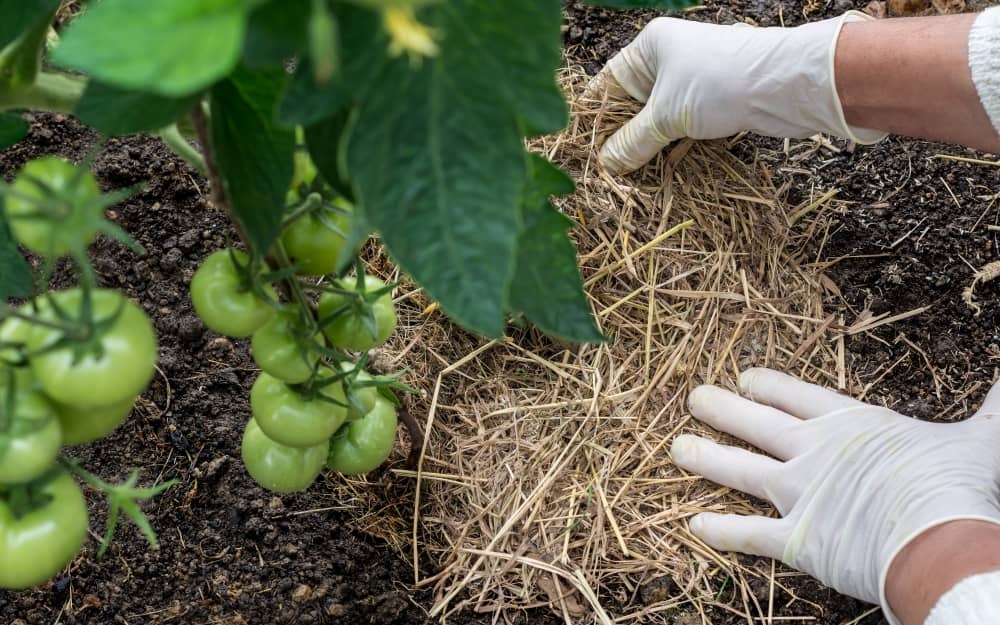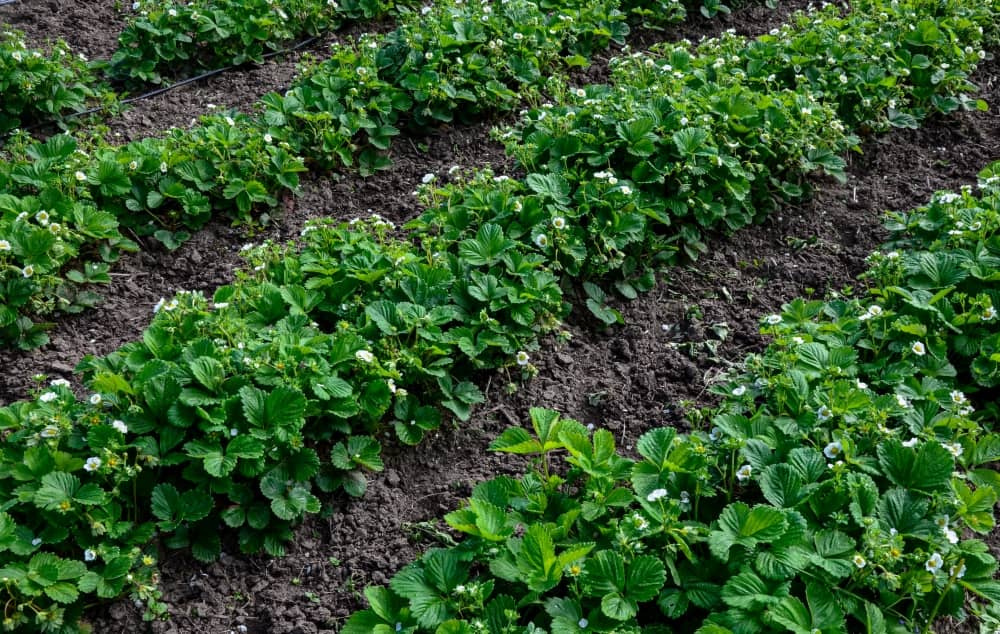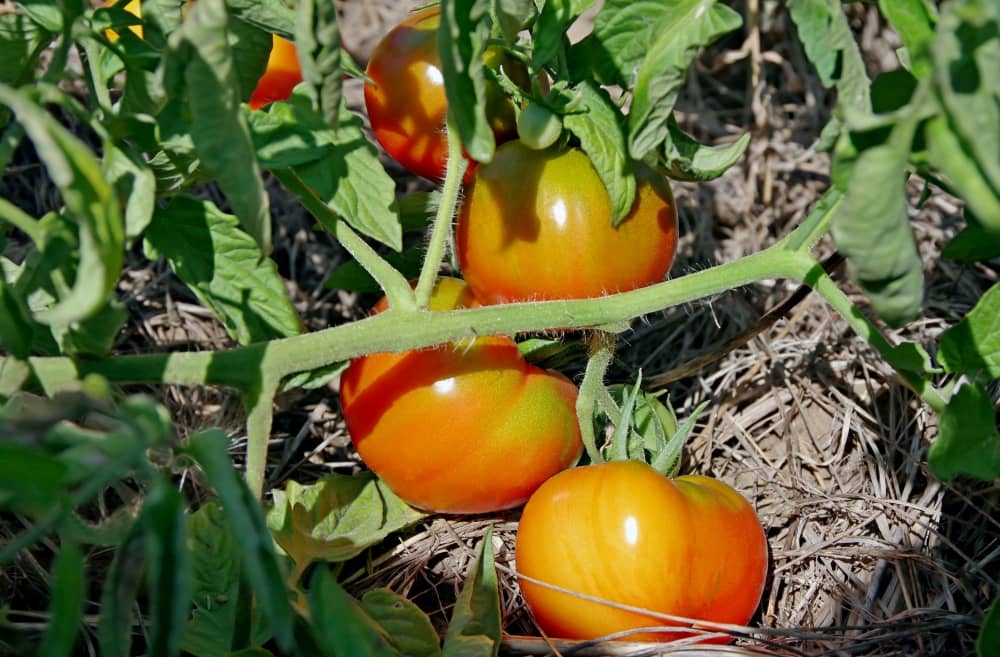A Complete Guide to Applying Mulch for a Vegetable Garden
Putting mulch in your vegetable garden has key benefits. Mulch can help to keep moisture in the soil of your garden, suppress weed growth and moderate the temperature of the soil. This leads to your vegetable garden having healthier plants and a better vegetable yield.
What Are the Benefits of Mulching a Vegetable Garden?
Mulching a vegetable garden can have several benefits, this includes:
- Retaining moisture: Mulch helps to keep the soil moist by reducing evaporation. This is especially useful during hot, dry weather, and prevents the plants in your garden from drying up in the summer.
- Preventing weed growth: By blocking sunlight from reaching the soil, mulch helps to prevent weeds from growing in your vegetable garden.
- Moderating soil temperature: Mulch can keep soil temperatures more consistent. This is extremely beneficial for many types of vegetables with different temperature needs.
- Improves soil structure: Mulch can improves soil structure by adding organic matter as it decomposes. This can lead to healthier vegetable plants and better yields
- Pest management: Mulch can discourage certain pests and insects by creating a barrier around the plants. Mulch can also attracts beneficial insects that feed on bad pests, making it easy to manage pests in your vegetable garden.
What Type of Mulch Can Be Used in a Vegetable Garden
Several types of mulch can be used in a vegetable garden, including:
- Organic mulches: These include materials such as straw, grass clippings, leaves, wood chips, and shredded bark. They help to improve soil structure, keep moisture, and suppress weeds.
- Compost: Compost is made from decomposed organic matter and can be used as mulch. It can add nutrients to the soil, improve soil structure, and attract beneficial insects.
- Grass clippings: Grass clippings can be used as mulch, but it is important to make sure that the clippings are not from chemically treated lawns.
- Straw: Straw is a popular mulch for vegetable gardens because it is readily available and easy to spread. It helps to retain moisture, suppress weeds, and protect plants from frost.
- Leaves: Leaves can be used as mulch, but it’s a good idea to shred them first so they don’t mat down and suffocate the plants.
- Bark Mulch: Bark Mulch is a wood product that can be used around plants, but it’s important to note that it doesn’t add organic matter to the soil and it takes a long time to decompose.
At Bibra Lake Soils, we have one of Perth’s biggest ranges of premium mulches. All of the mulch in our range offer similar exceptional performance, with the major difference being their aesthetics. Choose any from our range and enjoy greater benefits with the perfect aesthetic for your vegetable garden.
When Should You Mulch Your Vegetable Garden?
The best time to mulch your vegetable garden is after the soil has warmed up in the spring and after you have planted your vegetables. This allows the soil to keep moisture, suppress weeds, and moderate soil temperature.
It’s important to wait until the soil has warmed up to avoid trapping cold air and moisture in the soil. If you mulch too early, the moisture is also retained early and causes the soil to become too cold, which can slow down seed germination and plant growth.
Additionally, it’s best to mulch after planting so that you don’t disturb the seeds or seedlings when you are laying down the mulch.
How Often Should You Much Your Vegetable Garden?
The frequency at which you need to mulch your vegetable garden will depend on the type of mulch you are using and the conditions in your garden.
For organic mulches, such as straw, grass clippings, leaves or wood chips, it is necessary to monitor the depth of the mulch and add more as needed to maintain a consistent layer. This is because organic mulches decompose over time, which can reduce their effectiveness. The rate of decomposition depends on the type of mulch, the amount of moisture and heat, and the presence of microorganisms. It is generally recommended to add a fresh layer of mulch every 4-6 weeks during the growing season.
For inorganic mulches, such as rocks or rubber mulch, it’s less frequently needed to add more since it doesn’t decompose. But it’s important to check if it’s still in place and hasn’t been moved by wind or other factors.
Although mulch is a great tool to help your garden, it’s not the only way to achieve good results. Regular watering, fertilizing, and weeding will also be necessary for a healthy and productive vegetable garden. All that said, mulching is a great way to improve your vegetable yields. You can also take your vegetable cooking to the next level with seasonings, rubs and spices, such as the products by Big Dog Spices.
How Much Mulch Should You Put in Your Vegetable Garden?
The amount of mulch you should put in your garden depends on the type of mulch you are using, the size of your garden, and the specific needs of your plants. Generally, it’s recommended to apply a layer of mulch that is 2-4 inches deep (aim for about 75mm deep).
It’s also important to note that, while mulch can be beneficial, too much of it can be detrimental to plants. As the mulch decomposes, it can rob the soil of oxygen, leading to root rot and other issues. So it’s important to apply the right amount of mulch.
If you have any doubts, you can always consult with your local extension service for recommendations specific to your area.
What Are the Different Mulch Needs for Different Types of Vegetables?
Different types of vegetables have different needs when it comes to mulch. Here are a few examples:
- Root vegetables: Root vegetables such as carrots, beets, and radishes benefit from a light mulch layer. This helps to keep the soil cool and moist, which can improve the taste and texture of the roots.
- Tomatoes and Peppers: These vegetables require a lot of water and a mulch layer can help to retain moisture and suppress weeds. A mulch layer of organics can also help to keep the fruit off the ground and reduce the risk of disease.
- Leafy greens: Leafy greens such as lettuce and spinach prefer cool, moist soil. A thick layer of organic mulch can help to keep the soil cool and prevent the leaves from wilting in the heat.
- Cucumbers and Squash: These vegetables benefit from a mulch layer that helps to keep moisture and suppress weeds. But it’s important to keep the mulch a few inches away from the stem and leaves of the plants to prevent rot.
- Melons: Melons have a shallow root system, so a thick layer of mulch can help to keep the soil cool and moist. It also helps to keep the fruit off the ground and reduces the risk of disease.
- Berries: Berries such as strawberries and raspberries benefit from a mulch layer that helps to retain moisture and suppress weeds. Straw is a good option for berries because it keeps the fruit off the ground and reduces the risk of disease.
Keep in mind that these are general recommendations and the specific needs of each vegetable may vary depending on the variety, soil conditions and other factors.
When Using Mulch in a Vegetable Garden, Here Are a Few Tips to Keep in Mind
Wait until the soil has warmed up: It’s important to wait until the soil has warmed up in the spring before applying mulch. This helps to avoid trapping cold air and moisture in the soil, which can slow down seed germination and plant growth.
- Mulch after planting: It’s best to mulch after planting your vegetables so that you don’t disturb the seeds or seedlings when you are laying down the mulch.
- Keep the mulch a few inches away from the base of the plants: This helps to prevent rot and also makes it easier to access the base of the plants for weeding, fertilizing, and other tasks.
- Use organic mulch: It’s best to use organic mulch such as straw, grass clippings, or leaves, as they will decompose and add organic matter to the soil. Avoid using coloured or dyed mulch, as these can contain harmful chemicals.
- Monitor the depth: Organic mulches will decompose over time, which can reduce their effectiveness. Monitor the depth of the mulch and add more as needed to maintain a consistent layer.
- Avoid too much mulch: While mulch can be beneficial, too much of it can be detrimental to plants. As the mulch decomposes, it can rob the soil of oxygen, leading to root rot and other issues. So it’s important to apply the right amount of mulch.
- Consider the specific needs of your plants: Different vegetables have different needs, so make sure you are using the right type of mulch and applying it in the right way for the plants you are growing.





